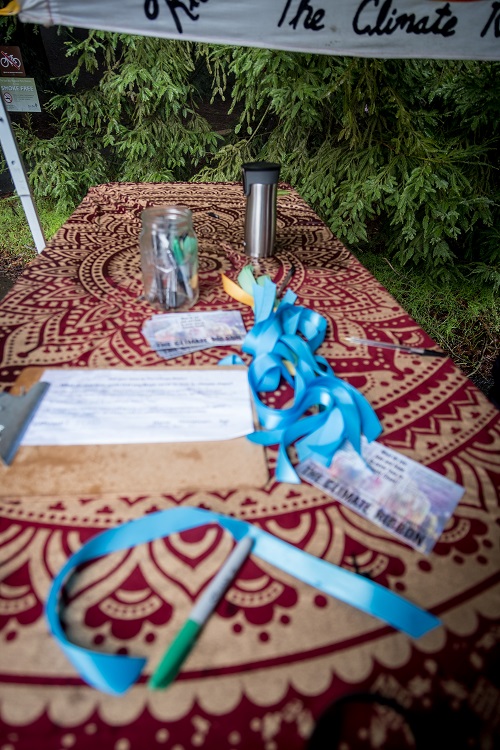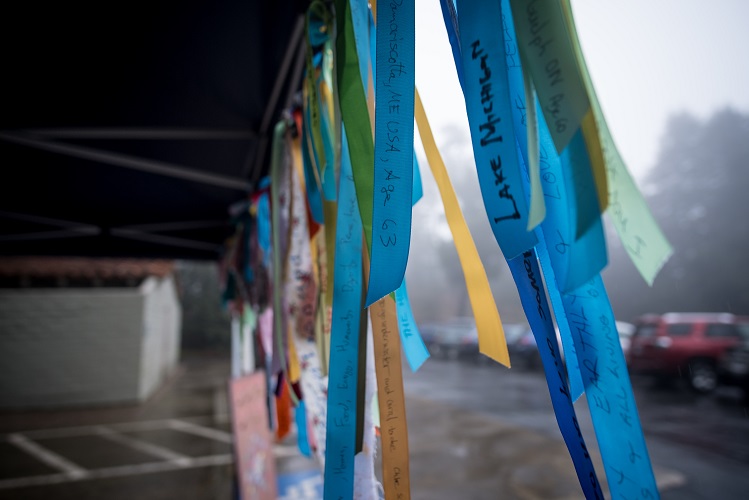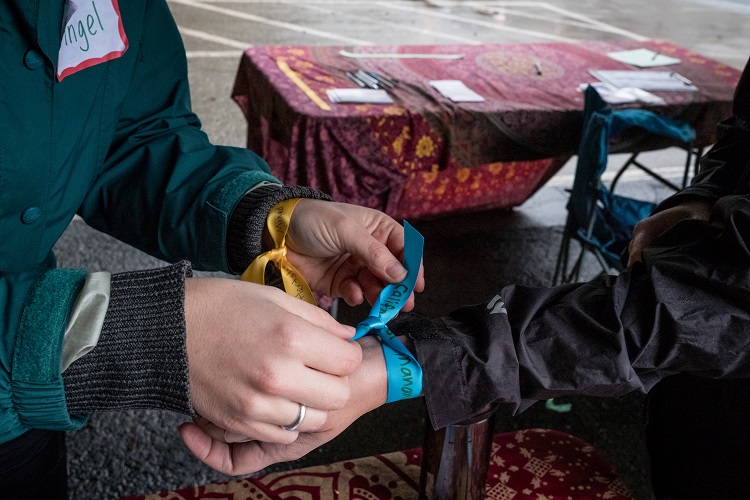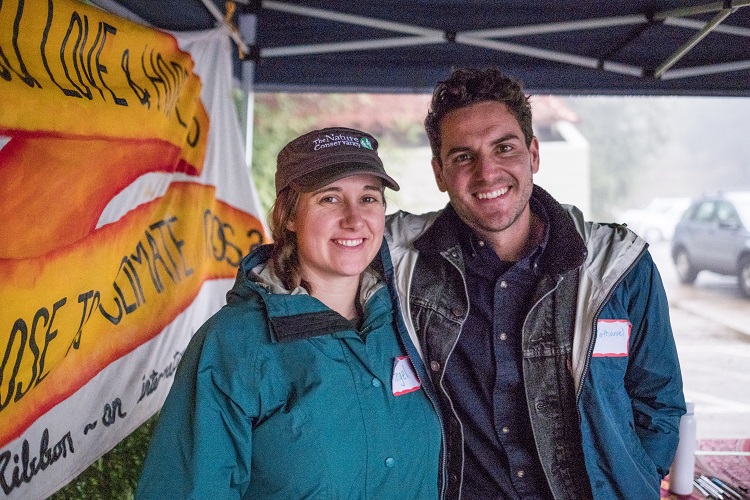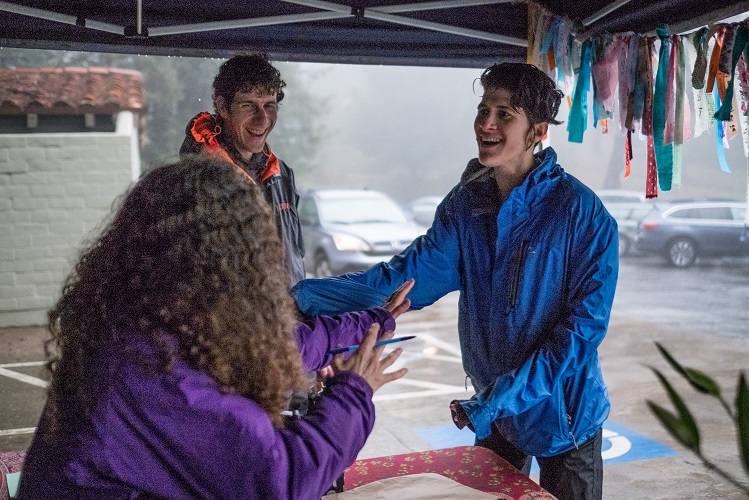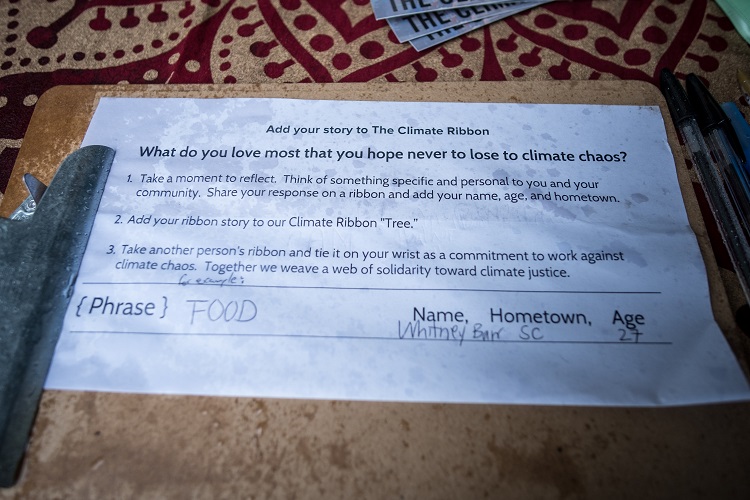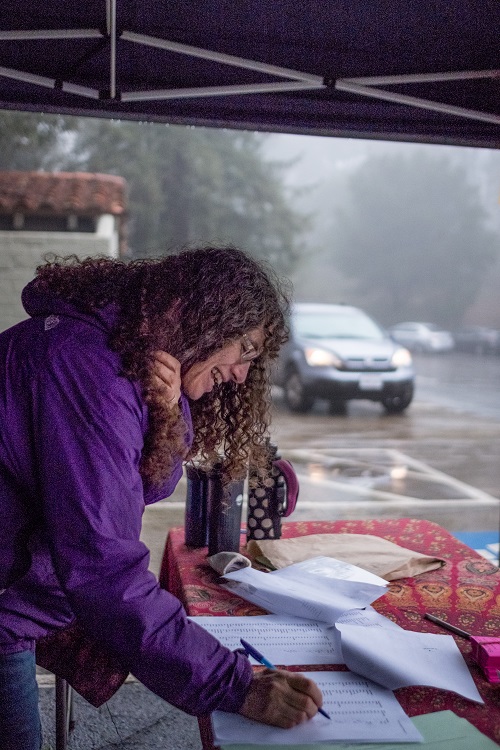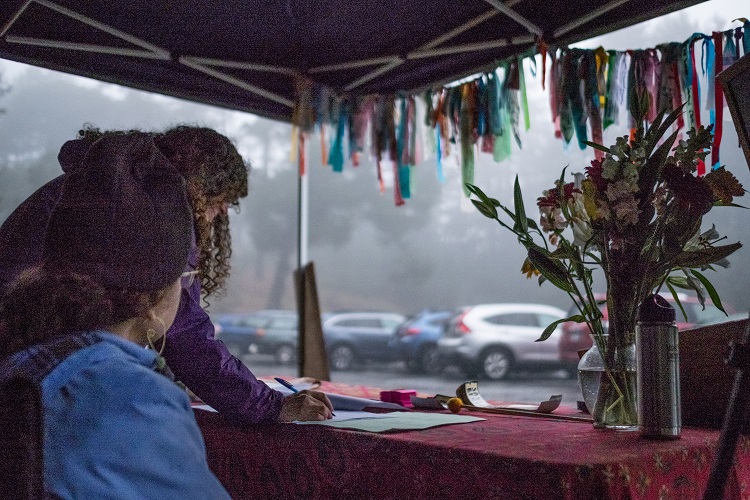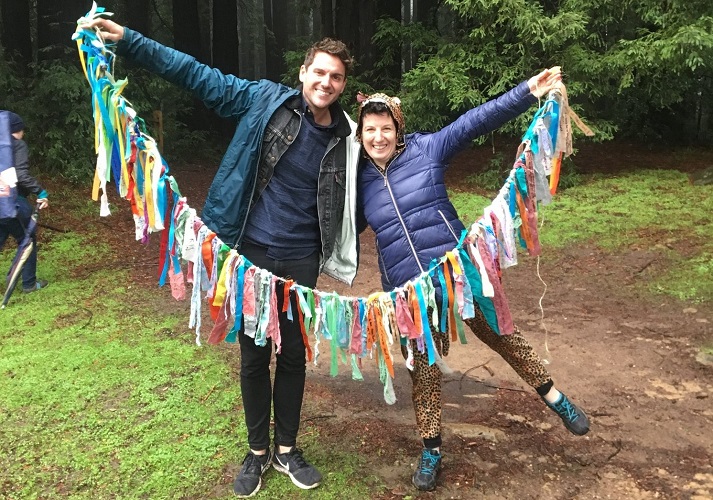By Rabbi Jill Hammer and Rae Abileah
The Climate Ribbon was featured at Wilderness Torah's Tu B’shvat in the Redwoods near Berkeley, CA. Tu b’Shevat means “the fifteenth day of the month of Shevat”— this day in the Jewish calendar is the Festival of the Trees. This year it began on Sunday night, January 20 and continued until Monday, January 21. The Talmud describes the holiday as the date on which all trees should be counted a year older, so it is known as the birthday of the trees. This day takes on added meaning now that we must wonder about the future for our oxygen-giving, life-supporting forests, which face rising global temperatures and increases in fires, floods, and other climate-related catastrophes.
Tu b’Shevat is a day honoring God as a tree-like entity sending its vital energies throughout the universe. In the 16th century, kabbalist Isaac Luria created a festival to celebrate this day: a celebration of the Tree of Life, and he instituted the ritual of a Tu b’Shevat seder, a sacred meal based on the Passover seder in which participants ate fruit in a sacred way, with blessings, in order to release and uplift the sparks of holiness hidden in the fruit. Tu b’Shevat thus came to symbolize the healing of the whole earth. We contemporary Jews still celebrate the Tu b’Shevat seder, often using it as a time to reflect on our responsibility toward the environment. Today, in an age where the earth’s ecosystems are profoundly threatened by climate disruption, Tu b’Shevat is a call to action, summoning us to protect the trees, and the Tree of Life which is Mother Earth.
One way to ritually weave this call to action into our Tu b’Shevat seder is by creating the Climate Ribbon ritual, using a tree (or tree sculpture) in our community. The Climate Ribbon is a global participatory storytelling project that invites participants to share the beloved things they stand to lose to climate change, and commit to protecting all that we can. “Next year’s harvest.” “Clean air and water.” “The future of our children’s children.” The simple, heartfelt participatory project engages participants in thinking about what they love in their specific town, city, or community and about a tangible action step they can take to support a renewable energy-powered future; it’s a collaborative act of story-sharing and commitment-making across generations. Together, our stories and commitments weave a giant thread connecting all of us as we work for a healthy, sustainable planet.
The custom of typing ribbons to a tree, in order to ask for wishes, hopes, and healing, has resonance in cultures around the world — from Tibetan prayer flags to Armenian wish trees — so this simple ritual has a powerful cross-cultural resonance that helps us move through the pain of the climate crisis towards hope and action. Experts have described people’s perceptions of climate change as “depressing,” “overwhelming,” and “unstoppable.” Often it’s not a lack of information that leads to inaction, but emotional paralysis. The story-sharing approach of the ribbon project transcends these obstacles by offering people a way to make climate change personally meaningful, take a tangible action step, and stay accountable to their community.
A story in the Talmud tells of Honi, who observed an old man planting a carob tree. “How long will it take for the tree to bear fruit?” Honi asked. “Seventy years,” was the answer. Honi asked him, “Are you certain you will live another seventy years?” The old man said, “I found carob trees in the world because my ancestors planted them for me. So too, I plant them for my children.” The story is a reminder that we are caretakers for a world that does not yet exist: the world of coming generations. It is upon us to tend the world so that they will find it healthy, abundant and beautiful. Through the ritual of the Climate Ribbon, we invite you to commit to climate action for the future of our children and their children to come.
This year on Tu b’Shevat, many Jewish communities are creating Climate Ribbons – from Wilderness Torah’s annual family-gathering celebration in Berkeley, to a Rosh Chodesh group in Los Angeles, to a Kohanot/Hebrew Priestess-let ritual event in Seattle. And, Tu b’Shevat this year falls on the same day – January 21 – as Martin Luther King, Jr. Day, so we have an opportunity through this ritual celebration of trees to truly take Dr. King’s words to heart: “We are tied together in the single garment of destiny, caught in an inescapable network of mutuality. And whatever affects one directly affects all indirectly.”
Download the free DIY kit for making a ribbon tree in your community!
Rabbi Jill Hammer, PhD, is an author, teacher, midrashist, mystic, poet, essayist, and priestess. She is committed to an earth-based and wildly mythic view of the world in which nature, ritual, and story connect us to the body of the cosmos and to ourselves. Rabbi Hammer is the Director of Spiritual Education at the Academy for Jewish Religion, a pluralistic rabbinical and cantorial seminary in Yonkers, NY. At AJR, she specializes in ancient and contemporary midrash, mysticism, ritual, and contemporary spirituality. She is also the co-founder of the Kohenet Hebrew Priestess Institute, a program in spiritual leadership for Jewish women. Rabbi Hammer is the author of five books: Sisters at Sinai: New Tales of Biblical Women (2001), The Jewish Book of Days: A Companion for All Season (2006), The Omer Calendar of Biblical Women (2012), The Hebrew Priestess: Ancient and New Visions of Jewish Women’s Spiritual Leadership, and The Garden of Time.
Rae Abileah is a co-founder and co-creator of The Climate Ribbon project. Rae is a contributing author to numerous books including Beautiful Trouble: A Toolbox for Revolution; Beyond Tribal Loyalties: Personal Stories of Jewish Peace Activists; Sisters Singing: Blessings, Prayers, Art, Songs, Poetry and Sacred Stories By Women; and Siddur HaKohanot: A Hebrew Priestess Prayerbook. Learn more about her creative projects at Create Well and @raeabileah.
Please see the beautiful photos below taken by Eli Zaturanski, www.elizphotography.com.


